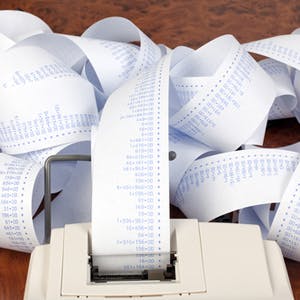To optimise cashflow management for small business, it is imperative that Goods and Services Tax (GST) registration suits the business operations.
Recently I worked with a client and we reviewed the way he reported (GST). His situation was slightly different to the typical business. Everything he sold, he sold overseas, so he never collected GST, and therefore never paid GST to the Australian Taxation Office (ATO). He had no turnover within Australia, so was not obliged to register for GST; however he made purchases in Australia, so paid out GST. It was therefore in his interest to register for GST, so he could claim the GST back.
As he was always owed GST, we opted for monthly, rather than quarterly or annual GST reporting periods. This meant that, yes he has the administrative burden of processing a BAS every month, however he also receives GST refunds on a monthly basis.
The third aspect we looked at to assist the client managing his cashflow, was to review the accounting basis by which he reported GST. I worked with him to move his monthly Business Activity Statement (BAS) from cash accounting to accruals accounting.
- Cash accounting: an accounting system where income and expenditure are recognised when the cash is received or paid.
- Accrual accounting: an accounting system where transactions and other events are recognised when they occur, not as cash is gained or paid.
The accruals options means that GST can be claimed on purchase invoices before the purchase is actually paid. Remember GST Paid is always remitted to the business from the ATO. Opting for the accruals basis simply speeds up this process. Now, if you do operate an accruals basis, you need to ensure all source documents are entered into the accounting solution in a timely fashion. Purchase invoices need to be entered before they are paid and this may require a change in mindset and bookkeeping processes.
Changing GST reporting from cash to accruals basis
Here is the step by step process we followed to change from cash to accruals basis.
- If you want to change from cash to accruals basis, the first thing you need to do is talk to your financial advisor, BAS Agent or tax agent to ensure you are making the right decision for your business situation.
- Next choose a date for changing from cash to accruals basis. I would highly recommend that this date is the first of the month, and in this scenario, we choose the first of July.
- Then contact the ATO to request the change. You could phone the ATO on 13 28 66, write to them, or ask your friendly BAS agent or tax agent to speak with the ATO.
- When you move from a cash to an accruals basis, you need to ensure that no legitimate GST claims are left out of the BAS that is prepared after the changeover. You need to ensure that any invoices dated prior to the changeover are included on the first BAS accruals report.
- Identify all purchase invoices dated prior to the changeover that had not been paid by the changeover date, and calculate the total amount and the GST amount. This needs to manually add to the new BAS calculation.
- Likewise identify all sales invoices dated prior to the changeover that had not been receipted by the changeover, and calculate the total amount and GST amount. This needs to be manually added to the new BAS calculation. In this scenario, this step was unnecessary.
- Please note reviewing the receivables reconciliation (detail) and payables reconciliation (detail) report as at the changeover date may not be totally accurate, as if payment was made on the third of the month, and the report printed on the fifth of the month, it would not recognise that purchase invoice, even though for accuracy it needs to be captured. (The MYOB support note instructions do not highlight this, and could possibly lead to error)
- Change the BAS template option from cash to non-cash (accruals), run the BAS process as normal, and the amounts identified in ‘5’ and ‘6’ should be manually added to calculated BAS.
- After the first month, processing BAS should be fairly straightforward. You must ensure that all invoices are entered before processing the BAS on a non-cash (accruals) basis.
In summary, the client only ever paid GST, so to maximise his cashflow situations he;
- Registered for GST
- Submitted BAS on a monthly basis
- Choose to report GST on a non-cash (accruals)
This advice is only general in nature. In all situations related to your GST registration you should speak with your BAS or tax agent.

